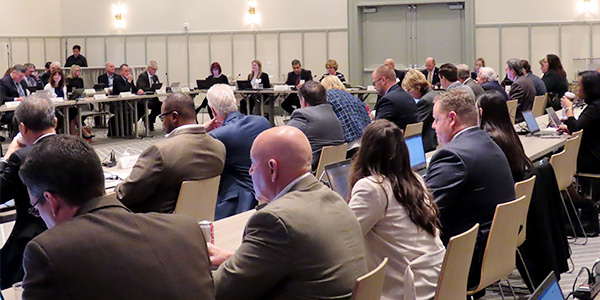The ongoing COVID-19 pandemic is leading to budget savings across the ERO Enterprise that have been welcomed by NERC and the regional entities amid uncertain economic conditions.
At a webinar Thursday to discuss their proposed 2021 business plans and budgets, NERC representatives noted that the assumption that stakeholder travel restrictions would continue into next year had helped the organization streamline its event schedule and reduce its meeting and travel budget by more than a third. The reduction helped to offset increases in other areas of the budget as NERC aimed to keep its assessment flat in response to economic uncertainty among the electric industry and load-serving entities. (See NERC Aims for Cost Control in 2021 Budget.)
NERC hopes to bring back face-to-face meetings as soon as it can — particularly major events such as the Member Representatives Committee and Board of Trustees meetings, both of which last met in person in February. However, the organization also said the success of its online-only meeting policy during the height of the pandemic has helped leadership realize that its schedule could tolerate a certain level of trimming without harming productivity.
“We’re currently not expecting … any of our major stakeholder events or board meetings [to be impacted] at this point, but we are just looking to lower the overall travel for the company and staff next year,” said Andy Sharp, NERC’s interim CFO.
REs See COVID Cost Reductions
Most of the RE members on the call echoed Sharp’s view, reporting various degrees of budget savings because of limiting events schedules. The organizations aim to follow NERC’s lead by keeping spending increases in check and thereby avoiding the need for raising their assessments.
Lam Chung, vice president and engineer for strategy, innovation and finance at Midwest Reliability Organization (MRO), said the RE projected a 26% decrease in its meeting and travel budget for 2021, mostly by hosting all but one of its outreach workshops and webinars at its office in St. Paul, Minn.
ReliabilityFirst is pursuing a similar plan. Carol Baskey, the organization’s treasurer and manager of finance and accounting, said three of its four off-site board meetings next year will be held on-site, while the fourth will be held via teleconference, leading to a 13.9% reduction in the meeting and travel budget.
The Northeast Power Coordinating Council and Western Electric Coordinating Council also expect to reduce their travel expenses by 20% and 15%, respectively.
SERC and Texas RE Are Outliers
SERC Reliability and Texas Reliability Entity represent the exceptions to the trend. The organizations are projecting meeting and travel budgets of $1.4 million and $407,000, respectively, an increase of 5.6% and 3.2% over last year.
Judy Foppiano, Texas RE’s CFO and director of corporate services, said her organization’s travel needs were because of “increased [critical infrastructure protection] activity, ERO Enterprise projects and travel required for additional [full-time equivalents].” George Krogstie, SERC’s CFO and corporate treasurer, said the RE’s additional spending was a result of added headcount, in addition to travel expenses from taking over the footprint of the Florida Reliability Coordinating Council last year. (See FERC OKs SERC’s Expansion into Florida.)
“We had budgeted a certain amount for 2020 to include the impact of Florida. Coming into the year, we realized that we did not budget enough … so we were looking at going overbudget this year on travel until the impact of COVID happened,” Krogstie said. He added that the organization has promised stakeholders that if pandemic-related travel restrictions mean it is unable to spend the full travel budget, the remainder will be used to reduce future assessments rather than for other uses by SERC.
NERC is requesting comment from industry stakeholders on the proposed business plan and budget by June 26. Stakeholders are also encouraged to participate in their relevant REs’ review processes.




